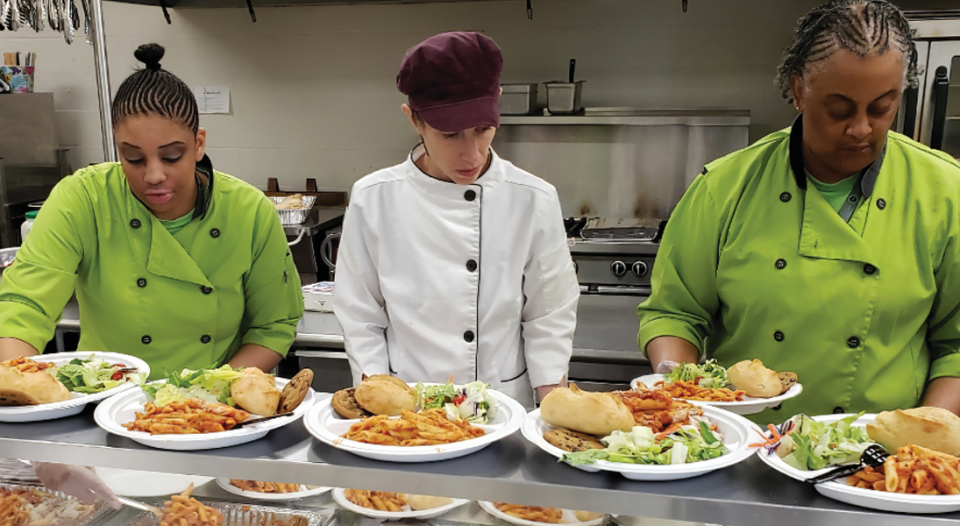Marie was looking for a second chance. A self-described addict serving time in the Ohio Reformatory for Women in Marysville, Ohio, she hoped for a brighter future that would include stability and a career direction. Then she heard about the pre-release program Chopping for Change.
Run by Lutheran Metropolitan Ministry (LMM), which works to promote justice through service and advocacy for those in need, Chopping for Change trains women in culinary arts. After participating in the program, Marie (name changed for privacy) landed a job in the kitchen of a highly regarded restaurant in downtown Cleveland—all before her full release from incarceration.
Laura Barbins, bishop of the Northeastern Ohio Synod, serves on the LMM board, and the synod provided a financial donation to the ministry. She said the mission of LMM and Chopping for Change aligns with the ELCA’s goals.
“With incarcerated and previously incarcerated people, there’s a lot of stigma and stereotyping and roadblocks that exist that make reentry into society extremely difficult,” Barbins said. “What Chopping for Change does is give people a real shot at a second chance. And I think that our theology of grace and reconciliation demands that we give people those second chances.”
The bishop said she understood the value of the program beyond the training after meeting two of its participants. “They get to come to the LMM building, where their education occurs, and the striking thing to me was how they talked about walking through those doors and being valued as a human being, which is not what they receive inside the prison system,” Barbins said.
“LMM is reminding those individuals, or maybe proclaiming to them for the first time, that they are valuable children of God, that their lives matter, their gifts and skills.”
“The ELCA is about seeing the image of God in every child of God, and that’s something that not very many people would think about in terms of this program. LMM is reminding those individuals, or maybe proclaiming to them for the first time, that they are valuable children of God, that their lives matter, their gifts and skills.”
Ian Marks, LMM’s vice president of workplace development, said the treatment of participants is as valuable as the skills. Part of that comes from therapeutic work as well, which allows the students to talk about more than working with food.
“We treat them with class and dignity,” he said. “When you’re locked up, you’re nothing but a last name and a number. As soon as you step foot in our place, it’s your first name. We humanize it, we treat you with dignity and we show you how much value you can provide in the community. Also, going through the program in a cohort model with other women who are facing very similar pieces as far as their history and what’s happened to them, they kind of build off each other. So I think the combination of these things really help to put them on the right track.”
The treatment by LMM workers isn’t lost on Marie. “They make you feel normal,” she said. “Nobody ever asks about your crime, they call you by your first name, nobody ever talks about your past. It’s like a clean slate from the day you walk in here.”
The training pays off in another way for the community. Chopping for Change participants learn, in part, by preparing more than 1,000 meals a day for those experiencing homelessness.
“Nobody asks about your crime, they call you by your first name, nobody ever talks about your past. It’s like a clean slate from the day you walk in here.”
“It’s really important to the ladies, that social service aspect to give back,” Marks said. “I’ve had a number of women who said, ‘I used to eat these meals in a shelter. I know how important they are.’ That giving back is a big piece of this. That respite of having a hot, nutritious meal and hopefully some fellowship over that meal and interacting with people who really care about your well-being and want to see you do the best, I think it makes a difference.”
The program’s other benefit to the community is its long-term effect on participants’ likelihood of returning to prison, Marks said.
“The recidivism that we’ve had from our women over the last six years or so has been less than 3 percent,” he said. “You compare that to the state average in Ohio for women—it’s about 18.5 percent. Also, we’re graduating people at about an 80-percent clip.” The program has expanded to include an accredited Associate of Applied Science degree and will soon accommodate men.
Marie said her new job will be kitchen prep for hundreds of meals. She’s not sure about long-term goals but is happy with her current opportunities, thanks to Chopping for Change.
“It heals people to become renewed citizens, to be able to go back into society, stay out of trouble, raise kids, be a good neighbor,” she said. “They give respect so that we can build our own respect.”





